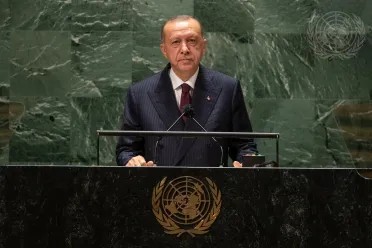Statement
Statement summary
RECEP TAYYIP ERDOĞAN, President of Turkey, spotlighted the global system that contributed to the widening gap between underdeveloped and developed countries during the pandemic. Vaccine nationalism left poorer economies on their own during this difficult time. Pointing out that the nature of the pandemic called for international cooperation and solidarity, he noted that that his country sent medical aid to 159 countries and 12 international organizations. Further, it would soon offer its national vaccine, “Turkovac”, to the benefit of all humanity.
Referring to recent developments in Afghanistan, he called for the help and solidarity of the international community. Recalling Turkey’s involvement with the humanitarian crisis in Syria 10 years ago, he stressed that his country was the only NATO member who fought Islamic State in Iraq and the Levant (ISIL/Da’esh) on the ground, as well as the PKK [Kurdistan Workers’ Party]. He called for a political solution through Security Council resolution 2254 (2015) in accordance with the expectations of the Syrian people.
Welcoming the extension of the United Nations humanitarian assistance mechanism in the north‑west of Syria via Turkey for 12 months, he stressed that making any distinction between terrorist organizations in the region and using them as subcontractors was unacceptable. With already 1 million Syrian refugees on its territory, Turkey was not able to absorb new immigration waves from Afghanistan. He urged the international community to do its share in line with Geneva Declaration on the 1951 United Nations Convention relating to the Status of Refugees and the 1967 Protocol, and international humanitarian law.
Commenting on several ongoing conflicts worldwide, among others he highlighted the role played by Turkey in Libya in securing a ceasefire, and he urged the international community to support the efforts of the National Unity Government. On the Israeli-Palestinian conflict he underscored that as long as the persecution of the Palestinian people continued, lasting peace and stability in the Middle East would not be possible. “Occupation, annexation and illegal settlement policies must absolutely and immediately be brought to an end,” he added. He also identified a fair, lasting and sustainable solution to the Cyprus issue which would shift the existing approach which ignores Turkey in the region. In this respect, he referred to Turkey’s proposal to organize an Eastern Mediterranean Conference, in which all actors in the region would take part in dialogue and cooperation.
Emphasizing that climate change was a great concern, he argued that “whoever has wildly exploited natural resources, should also make the greatest contribution to the fight against climate change”. His Government had not implemented the Paris Agreement yet as it considered the obligations to signing parties unequal. However, Turkey’s determination of contributions under the Paris Agreement would be presented before the national Parliament next month. In addition, his country would announce its carbon neutrality ambition during COP26. On a national level, he highlighted Turkey’s achievements to address climate change, including the preparation of an action plan to comply with the European Union’s “Green Deal”.

